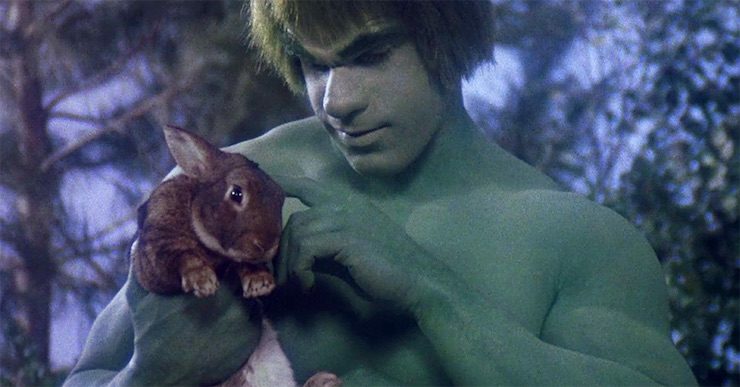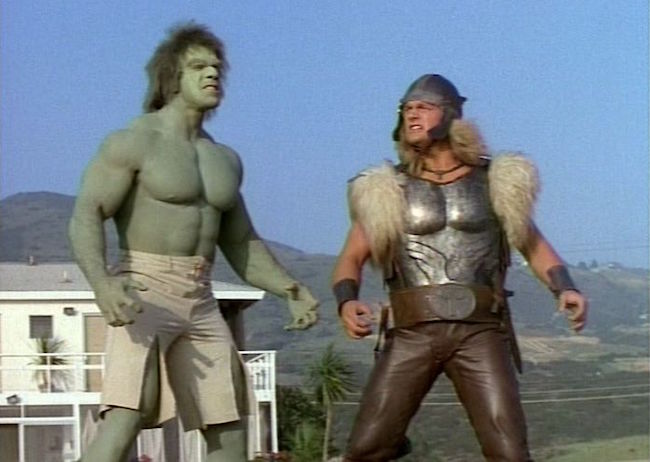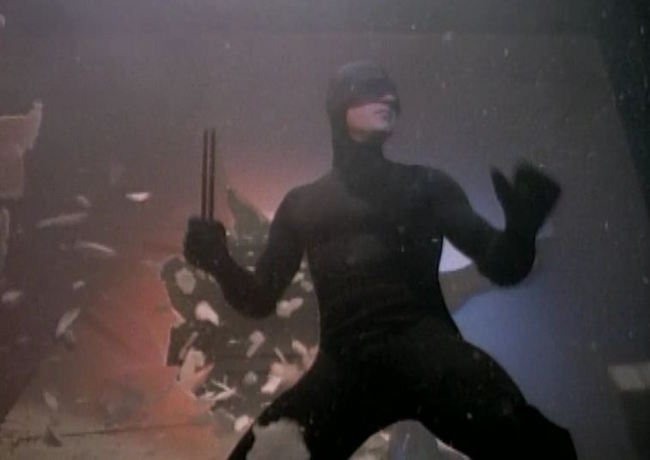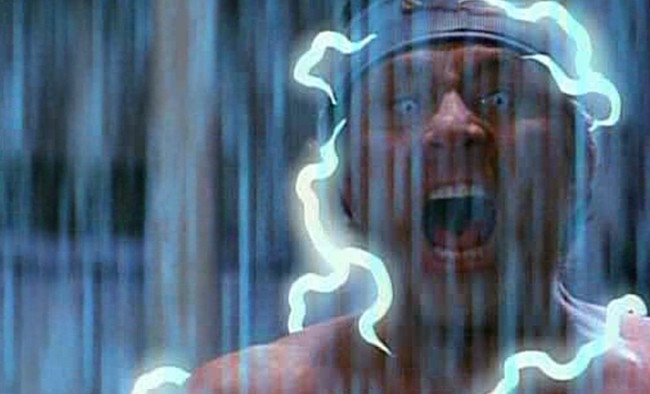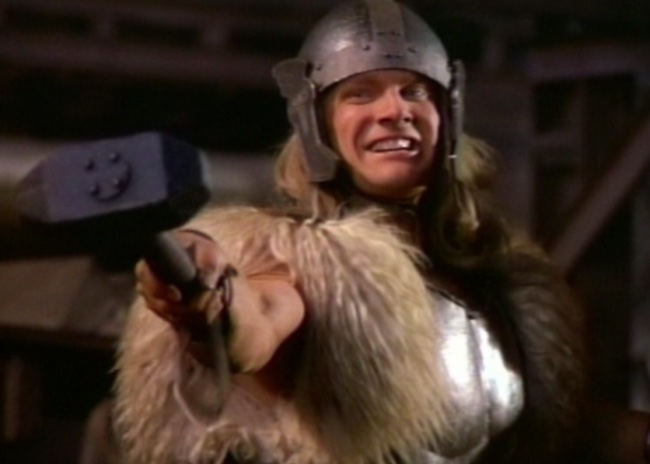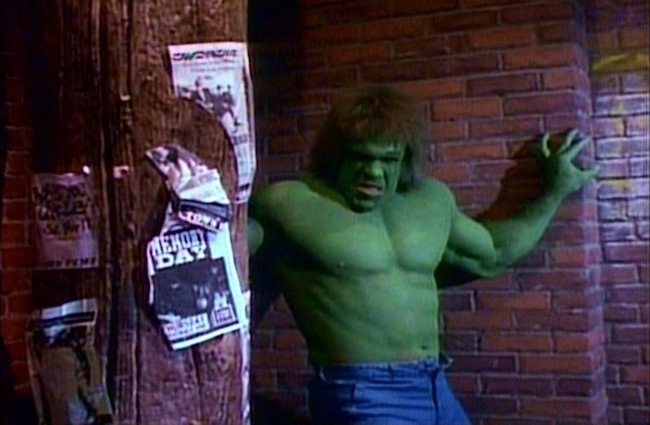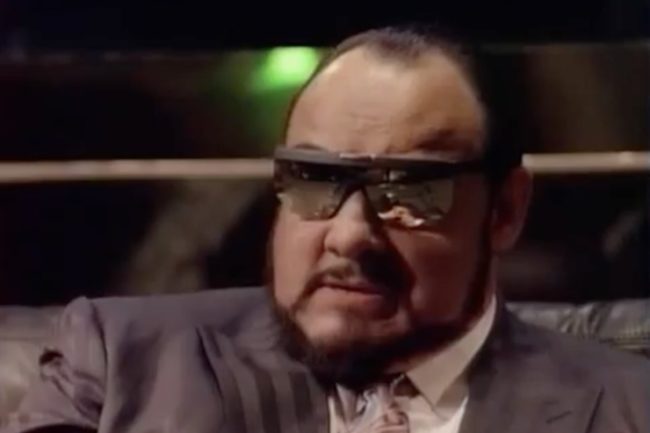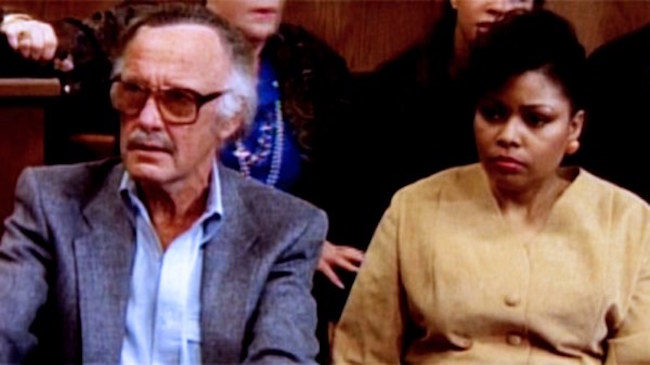The Incredible Hulk had a respectable five-year run on television. It remained an iconic part of popular culture, from “you wouldn’t like me when I’m angry” taking root in the popular consciousness to a hilarious offhand reference to the show in The Usual Suspects.
Six years after its cancellation by CBS, New World picked up the rights to the show and sold it to NBC. New World owned Marvel at the time, and they wanted to use their only real TV success as a springboard to try to launch other heroes into television.
Partnered with Bill Bixby, they produced two movies in two years that also served as backdoor pilots, one for Thor, one for Daredevil. Neither of these went to series, and the third movie a year after that was a Hulk solo film that ended the Bixby/Ferrigno era with the Hulk’s death. (A sequel was planned, but scrapped due to poor ratings for The Death of the Incredible Hulk. Any chance of reviving the series died with Bixby in 1993.)
Still, these first two movies were the first attempt at a “Marvel Cinematic Universe.” Indeed, any kind of coherent universe for any superheroes, truly. There had never before been this kind of guest appearance of another hero from a company’s “universe.” No other DC heroes ever appeared in The Adventures of Superman, Batman, or Wonder Woman, no other Marvel heroes ever appeared in Spider-Man or The Incredible Hulk. Ditto for the various movies, though Superman would later get a brief mention in Batman & Robin.
Thor had more significant changes from his comic-book roots—and actually in some ways was closer to his Norse roots, as the Thor of mythology is a hard-drinkin’ womanizing jackass, far from the noble hero Stan Lee and Jack Kirby gave us in 1962. Meanwhile, Daredevil actually hewed fairly closely to the setup and origin from the comics, with the costume changed from the iconic red devil outfit to a simple black bodysuit and the supporting cast altered.
Despite being the developer and show-runner for the series, and despite being good friends with Bixby, Kenneth Johnson was not involved in these three movies, not even knowing about them until he started seeing commercials for them.
While both Bixby and Ferrigno return for all three, Jack Colvin only appears in the first movie. Shortly after filming of the first film, Colvin suffered a minor stroke and retired from acting, so we never saw McGee again after The Incredible Hulk Returns. The Trial of the Incredible Hulk also started the tradition of Stan Lee making cameos in Marvel screen adaptations, as he appears as a juror in the dream sequence that gives the movie its title.
“You can’t win the game unless you’d rather die than lose it!”
The Incredible Hulk Returns
Written and directed by Nicholas Corea
Produced by Bill Bixby & Nicholas Corea
Original release date: May 22, 1988
David Banner’s life is actually looking pretty good. Yes, he has nightmares, still, but he hasn’t turned into the Hulk in two years. He’s working as a technician at the Joshua Lambert Research Institute as David Banion. Lambert knows that he’s got a past he won’t talk about, and knows that he’s smarter than the average technician, but Lambert is willing to keep his secrets because “Banion” is responsible for the creation of the Gamma Transponder, which will be a fantastic energy source. Banner has also been making additions to it after-hours that will enable the device to possibly cure him of being the Hulk forever.
Banner is also in a relationship with a bio-geneticist at the institute, Maggie Shaw. He spends most of his time with her, but isn’t ready to move in yet—not until he’s rid of the Hulk, though she knows only that he has anger-management issues he needs to get under control.
One night, Banner finally is ready to use the Gamma Transponder on himself, but he’s interrupted by a young man who’s broken into the institute: Don Blake. A doctor who studied under Banner at Harvard ten years earlier, he recognizes “Banion” as his favorite professor from med school, whom he thought was dead.
Blake has a problem, and he hopes Banner can help him. Having always had an interest in Norse myth, he joined a climbing expedition in Norway as the doctor. During a nasty storm, he found himself drawn to a cave where he found a sarcophagus, which was covered in runes he could read, much to his surprise. In the sarcophagus was a dead body in armor and a hammer. Gripping the hammer caused the corpse to come alive as Thor, an arrogant war god who has been forbidden from entering Valhalla until he becomes more humble. He is tethered to Blake, who can summon Thor and banish him to the nether realm he was in at any time.
Banner thinks that Blake was hallucinating due to the thin atmosphere. We will now pause to be amused at the guy who turns into a big green rage monster at the slightest adrenaline spike being skeptical about this. Blake realizes he has to prove it, so he summons Thor, who shows up, is brutish and arrogant and starts trashing the lab. Banner tries desperately to keep himself calm, which lasts right up until Thor tosses him into a electrified computer bank. Thor himself realizes he’s being a jerk, and saves Banner, but the damage is done: Banner’s eyes go white and he Hulks out.
Hulk and Thor duke it out in the lab, trashing a lot of the equipment, and eventually the Hulk buggers off.
Thor manages to find a bedraggled Banner the following morning, before Blake banishes him again. Blake shows Banner the newspaper, and everyone assumes it’s a publicity stunt. One person who doesn’t, though, is Jack McGee, who has, since the end of the TV show, been fired from the National Register, amidst some nasty words to his editor. He grovels for his job back now that there’s a lead on the Hulk.
Blake promises to help Banner fix the equipment. The Gamma Transponder itself is fine, but the computer controls are trashed and need to be replaced.
Meanwhile, Lambert’s brother Zack is tired of being in his older sibling’s shadow, and works out a deal allow a mercenary named LeBeau to steal the transponder and sell it to the highest bidder, with Zack getting a cut. Part of the deal is to take Banion, whom Zack knows is the real brains behind the device. The first attempt to steal the transponder fails thanks to the Hulk. Now that a first attempt has been made, security will be increased, so LeBeau decides to kidnap Banion’s girlfriend with himself and the transponder as ransom.
LeBeau’s thugs manage this, despite the best efforts of both Thor and the Hulk. When the Hulk reverts to Banner, he decides he needs to trash the main component of the transponder before turning it over to LeBeau. Why he decides this remains unclear. Zack is not happy that they’ve kidnapped a friend and colleague, and so LeBeau shoots him. From his hospital bed, Zack tells Banner and Lambert where they’ve taken Maggie, and Blake, Thor, and Banner head there to rescue her. Lambert also shows up with a gun, and he and Banner get into an altercation that leads to Banner Hulking out. Thor, Blake, and the Hulk take down the mercenaries and rescue Maggie.
With McGee still hanging around, and all the publicity surrounding the institute, Banner realizes he must leave, and start from scratch on his search for a cure. He bids goodbye to Maggie, to Blake, and to Thor and wanders down the road to piano music…
“I was sighted until I was fourteen—I remember green.”
The Trial of the Incredible Hulk
Written by Gerald Di Pego
Directed by Bill Bixby
Produced by Bill Bixby & Gerald Di Pego
Original release date: May 7, 1989
Banner, now calling himself David Belson, is working a rural migrant-labor job, but he leaves rather than suffer the constant bullying he receives at the hands of one of his coworkers. He heads to “the city” (which looks a lot like Vancouver), figuring he can get lost there.
He rents a crappy room in the shadow of a skyscraper, recently constructed by Wilson Fisk. Publicly, Fisk is a successful businessman. In reality, he’s a surveillance-obsessed crimelord, with half the police force on his payroll, as well as many other folks. He supervises a well-orchestrated jewelry heist, and two of the thieves get on the subway, into the same car as Banner and a woman named Ellie Mendez. Flush from the successful heist, one of the thieves decides to harass Mendez. At first Banner stays out of it, but eventually his heroism wins out and he tries to help her—which gets him tossed ass-over-teakettle behind a couple of seats.
Naturally, he turns into the Hulk, trashing the car and the thugs, and then taking off down the tracks. The cops find a shirtless Banner on the tracks and arrest him.
Mendez is taken to the hospital with a concussion. After a visit from Fisk’s thugs—who are let in by the floor nurse, who is also on Fisk’s payroll—Mendez tells the police that “Belson” is the one who attacked her, and Fisk’s pet thugs tried to help her.
Matt Murdock is a blind attorney-at-law, who has a thriving practice with his partner Christa Klein, and their paralegal, a former Army sergeant named Al Pettiman. Murdock has been trying very hard to bring Fisk down. For that reason, Murdock offers to represent Banner pro bono. Banner, however, refuses to cooperate and is unwilling to stand trial, fearing that the stress of it will cause him to change. Murdock doesn’t believe that he only cares about himself simply because he helped Mendez in the first place.
Banner has a clandestine conversation with Deputy Chief Tindelli, who appears to be one of the few cops who isn’t on the take. He tries to get Banner to talk, saying there’ll be no consequences (never mind that Banner has already almost been shanked once), but Banner refuses.
Murdock visits Mendez in the hospital, though she sticks with her story. Fisk orders Mendez to be killed, but she’s saved by a local vigilante called Daredevil (graffiti singing DD’s praises are all over town). Mendez is put in a secure wing, and she then calls Murdock and—livid that they tried to kill her even after she did as she was told—recants. Unfortunately, one of the security guards covering her is also on Fisk’s payroll, and he kidnaps her, taking her to Fisk Tower.
Banner has a nightmare about standing trial and turning into the Hulk. (We don’t realize it’s a dream sequence at first, though there are several hints, not the least being that the Hulk is way more violent here, tossing someone out a window to his death and strangling the prosecutor. Banner’s subconscious has a much more jaundiced view of the green guy.)
Unfortunately, the stress of the nightmare causes him to Hulk out and break out of prison, mostly by breaking the prison. When he reverts to Banner he goes to the flophouse to pack and leave town, but Daredevil is waiting for him. To keep him in town, Daredevil takes off his mask to reveal that he is Murdock.
They retire to Murdock’s house where we get his origin: fourteen-year-old Murdock saved an old man from being hit by a truck. That truck was carrying radioactive waste, which spilled and hit his eyes. He was blinded, but his other senses increased tenfold and he has a kind of radar sense that allows him to detect objects. It’s how he can function as Daredevil.
DD works with Tindelli, who has an untraceable phone link to Daredevil. Banner is willing to help Murdock save Mendez. Tindelli calls with a tip that may indicate where Mendez is being held. But after Daredevil leaves to rescue her, Tindelli calls back—the person who provided that tip is now spending money like there’s no tomorrow, and the deputy chief thinks it’s a setup. Banner hears this, and follows DD to the abandoned movie studio where she’s being held.
Sure enough, there’s an ambush, with Fisk hitting Daredevil with bright lights and loud sound to disorient him while his visor’d, ear-protected thugs beat the crap out of him. (The lights, of course, have no effect, but the sound is twice as bad for DD’s sensitive hearing.)
Banner sees this, Hulks out, and then the big dude trashes the place, though the thugs manage to spirit Mendez away. A battered Daredevil has his hands on the Hulk’s face when he calms down and changes back to Banner.
They return to Murdock’s home, where Banner scrapes the rust off his medical degree and treats Murdock, who’s moping because he got his ass handed to him. Banner gives him a pep talk, using the exact same words that Murdock used on Banner to try to get him to help him bring Fisk down. Eventually, Murdock comes around, and he puts the outfit back on.
Mendez is still being held hostage. Fisk’s right-hand man, Edgar, asks Fisk what they should do with her, and Fisk is very confused when he asks if she’s still alive. When Edgar replies in the affirmative, Fisk simply asks, “Why?” However, Edgar has taken a rather creepy shine to Mendez, and he keeps her alive.
Tindelli informs Daredevil that Fisk is gathering crime bosses from all across the country. Fisk’s plan is to unite them all into one gigunda syndicate, and he’s using the footage of Daredevil getting his ass kicked as his presentation piece (with all the Hulk footage edited out, of course). None of these crime bosses have outstanding warrants on them, so Tindelli can’t do a thing about it. But Daredevil can—he and Banner head to Fisk Tower. Daredevil takes on Fisk’s thugs, while Banner searches for Mendez. Banner arrives just in time to save Mendez’s life—the same thug who harassed her on the subway and started this whole mishegoss has been ordered by Fisk to make Edgar kill her—and Edgar actually helps Banner and Mendez escape. When Mendez points out that Fisk will kill him, Edgar says that Fisk will forgive him—he’s the only one Fisk does forgive.
Daredevil takes down Fisk’s thugs and then crashes the high-powered meeting. Fisk and Edgar escape in a hovercraft.
Mendez is safe and well, Banner decides that he needs to get back to trying to cure himself, so he’s heading to Portland to check out a new radiation lab. He and Murdock part ways, each entrusting the other with their secrets, and he wanders down the road to piano music…
“I am free…”
The Death of the Incredible Hulk
Written by Gerald Di Pego
Produced and directed by Bill Bixby
Original release date: February 18, 1990
Calling himself David Bellamy and pretending to be mentally challenged, Banner now works as a janitor at a government facility (presumably the one in Portland he talked about at the end of the previous movie, though it’s never specified what city they’re in). Also working there is Dr. Ronald Pratt, whose work with radiation Banner has always admired, and whose theories were among those he studied when he first did the experiment that turned him into the Hulk way back when.
Banner has been sneaking in after hours and making adjustments to Pratt’s experiments. Pratt has been reluctant to learn his mystery guardian angel’s identity because he’s worried that he’ll go away, as his notes have been brilliant. But eventually common sense prevails, and he installs video surveillance. (Why this government facility doesn’t already have video surveillance is left as an exercise for the viewer.)
Meanwhile, we meet a chameleonic woman named Jasmin, who is working as a spy for a group of Eastern European revolutionaries who are supposedly fighting for “the cause.” What this cause is, where they’re actually from, what their true goals are, who’s funding them—none of this is ever revealed, though they seem to trade in intelligence and weapons. After Jasmin completes her job of getting information from a congressperson, her handler, Kasha, gives her her next job. Jasmin wants this to end, but then Kasha shows her a picture of her sister being held prisoner. Her sister will die if Jasmin doesn’t continue her work.
Jasmin’s next assignment is to obtain Pratt’s work.
Pratt confronts “Bellamy,” and realizes that he’s actually the supposedly dead David Banner. Pratt is stunned, but is willing to let Banner in as an unofficial consultant on the project, which might be able to cure him of being the Hulk. They actually have him change into the Hulk under controlled conditions (something Banner quails against at first, probably remembering what happened the first time he tried that), and later Banner watches the video footage in awe. He’s never actually seen the Hulk before.
Unfortunately, Pratt is about to lose his funding because his work has insufficient military applications. If they’re going to try to cure Banner, they have to do it soon before the plug is pulled.
Naturally, the night they do the experiment is the night that Jasmin infiltrates the facility, having obtained fingerprints from one of the security guards while chatting him up in a bar, while stealing another guard’s uniform from her dry cleaners.
Jasmin’s break-in forces Pratt to abort the experiment, but then things go horribly wrong, there’s a fire, Pratt is injured, and Banner Hulks out. Pratt is unconscious and is taken to the hospital, and he’s only alive because Jasmin pulls him away from the fire.
Kasha is ready to have Jasmin killed for her failure, as the facility’s in lockdown and Pratt’s in a coma, making the intelligence unavailable. Jasmin manages to save herself by mentioning Banner—he was part of whatever experiment Pratt was performing, and perhaps he knows the specifics. Jasmin is sent with two others to kidnap Banner. However, Banner manages to foil the kidnapping, aided by the distraction of the other thugs trying to kill Jasmin, whose death sentence was only stayed, not stopped.
One thug gets away, the other is shot and killed, but before he dies he reveals to Jasmin that her sister Bela is the head of their movement—she faked the kidnapping to get Jasmin to continue to work. Banner takes Jasmin to a remote cabin and treats her gunshot wound. Then he goes to visit Pratt in the hospital, but he’s still wanted in connection with the fire at the facility, so he has to sneak in—Jasmin, grateful for his aid, helps with that, using her mad spy skillz to get them into his room.
Banner’s words of encouragement (as well as mentioning a school prank Pratt was involved in) help bring Pratt out of his coma. After Banner and Jasmin leave, they are attacked by Kasha’s people, but Banner Hulks out and saves them both. Jasmin gets away on her own, while the Hulk runs off, and when he reverts to Banner, they rendezvous at the cabin. The two of them fall into bed together.
Pratt is moved to a more secure facility, but Kasha’s people manage to get him and his wife away with a stolen ambulance.
Banner and Jasmin plan to go away somewhere and start over (Banner has been doing that on a regular basis for years now, after all, and he didn’t have Jasmin’s talents for blending in and changing faces), but then Jasmin hears the radio report on Pratt’s kidnapping and reluctantly shares it with Banner. Banner has to try to rescue them, and Jasmin agrees to help, even though she just wants to go away. Jasmin works a contact of the movement who runs a car shop, and they find out that the Pratts are being held at an airfield. They leave the car salesman for the police with a note about the airfield. The federal agents who are in charge of the Pratts’ case—who are already pissed that the Pratts were kidnapped right from under their noses—head to the airfield with a mess of cops.
Bela’s people are questioning the Pratts, who are cooperating out of fear. However, once the cops arrive, the guard who sees them immediately opens fire. Things go to hell in a hurry. Banner manages to free the Pratts, Bela shoots Kasha (who has already made a play for her position), Banner Hulks out, Bela tries to escape in a plane, but the Hulk jumps onto it. Bela rather stupidly tries to fire her weapon inside the plane, which results in it exploding. The Hulk plummets to the tarmac and dies in Jasmin’s arms.
“When the troll’s upon you, you’re a mighty fighter!”
It’s funny, rewatching Returns and Trial, I had no trouble remembering everything that happened. Even though it’s been decades since I watched them last, I still had clear, detailed memories of many of the events and performances in those two movies.
For Death, I had nothing but a vague memory of a scene here and a scene there. Which is especially odd given that two favorite actors of mine—Elizabeth Gracen and Andreas Katsulas—are in it. But where watching the first two was revisiting a couple of old friends, the third was almost like new.
Watching it again now, the reason is that Death just isn’t very good. Honestly, neither is Returns, but it’s mitigated by excellent performances by Steve Levitt as Blake and especially Eric Kramer as Thor. Kramer embraces the joyous-warrior aspect of Thor wholeheartedly, and it’s great fun to watch, and Levitt’s lost-at-sea Blake sets up a possible TV show nicely. Just as the changes to the Hulk from the comics made for a strong television narrative, so too would have the changes they made to Thor. It’s funny, by the time this movie aired, the comics themselves had abandoned the Don Blake identity for Thor. Unlike many changes made to comic book characters, this one has remained permanent (with one brief exception), a testament to how uninteresting and pointless it was.
However, this take on it had potential: the two of them sharing a relationship instead of being two different aspects of the same person. I particularly like that both Blake and Thor had journeys they needed to go on (the former toward meaning in his life, the latter toward humility, both of them toward heroism), and I’m disappointed that we didn’t get to see that journey.
The story that introduced them was dumber than a box of, um, hammers. (Sorry.) It makes no sense for Banner to agree to set aside the experiment that has the potential to cure the nightmare of his existence so he can have a conversation with a student he hasn’t seen in a decade. It makes no sense that Banner would trash the vital component to the Gamma Transponder.
And it especially makes no sense that the bad guys would shoot the younger Lambert. Seriously, these guys are mercenaries and thieves. Murder is a more serious offense than thievery, and one that will bring more attention from law-enforcement down upon one. Plus, of course, shooting someone and not making sure he’s dead before you walk away runs the risk of him, say, telling someone where you’re hiding out and going after you. (This is made worse by the fact that he might tell someone who turns into a big green rage-monster, but one can understand their inability to predict that ahead of time.)
Even more frustrating is how they botch Banner’s romance. The opening of the movie is all about the happy life he has with Maggie, and then Maggie becomes utterly irrelevant (except as a kidnap victim, snore) for the rest of the movie. At the end of the movie, he leaves Maggie and the institute behind without any kind of conversation or anything, he just leaves because it’s the end of the movie and that’s what’s supposed to happen. He doesn’t even make a token attempt to stay or to consider Maggie’s feelings. It just feels perfunctory.
Again, though, Returns is worth sitting through the dumb plot (and Charles Napier’s hilarious attempt at a Cajun accent) for the Thor stuff, plus Bill Bixby remains superb as Banner. I especially like that Banner doesn’t let Blake off the hook for how badly he’s screwed everything up.
Death has no such redeeming features. The bad guys are so incredibly generic that we have absolutely no idea what they’re doing. Seriously, nothing about this group is explained. They all talk with Eastern European accents, plus Andreas Katsulas plays one of them, so we know they’re evil, but—what? I mean, they’re just there to be evil and talk vaguely about causes and that’s it.
And once again they botch a romance, though this one is worse. In Returns, they do an excellent job of establishing Banner and Maggie’s romance at the top of the movie—the problem is that it doesn’t go anywhere after that. In Death, the “romance” between Banner and Jasmin just doesn’t track. Them falling into bed together actually works—they’re both in a bad place emotionally, as Banner’s had yet another cure yanked out from under him (latest in a series! collect ’em all!), while Jasmin has had her entire life ripped apart, and finding solace in each others’ arms is a natural outgrowth of what they’re going through. But the leap from that to running away together and being each others’ twue wuv strains credulity to the breaking point. We’ve seen Banner have relationships with several women, and his romance with Jasmin is the only one that isn’t convincing as a romance.
Which is too bad, because Elizabeth Gracen is, as always, superb, showing Jasmin’s spycraft as well as her pain and anguish. And it’s fun watching her play different roles, and I particularly enjoyed her “duh!” expression when Banner asked how they could possibly get past hospital security to visit Pratt. Gracen has always impressed me with her acting work since she played Amanda on Highlander: The Series and its spinoff Highlander: The Raven, and she outshines the limitations of the script.
One of those limitations is the really appalling impersonation Banner does of a mentally challenged janitor, which just feels oogy watching it now. Having said that, Bixby is also brilliant here, particularly the friendship he develops with Pratt, which is as natural and joyous as his friendship with Elaina Marks in the pilot.
As with Returns, the ending is just wrong, though it’s worse here. The plane takes off, Hulk is holding onto it and then Bela just whips out a gun a starts shooting? These revolutionaries (or whatever the hell they are) are good enough to steal a scientist and his wife from under the nose of federal agents but they’re not bright enough to know not to shoot a gun on an airplane in flight? Really?
And then we have the death of the incredible Hulk because he falls from a great height. And that’s it. It’s the most anticlimactic climax ever and just sits there on the screen, posing a lot more questions than it answers.
Questions that will never be answered, as the response to this movie was so justifiably putrid that the planned sequel was trashed.
Between these two, though, we have one movie that actually succeeds. The storyline hews pretty closely to Frank Miller’s first run on Daredevil—the run that vaulted DD to a more prominent role in the Marvel Universe, where previously he’d pretty much just been a second-rate Spider-Man—during which Wilson Fisk, the Kingpin of Crime, became DD’s primary bad guy. The reinterpretation of Fisk as someone obsessed with video surveillance is an interesting one (and is particularly amusing to watch two decades later when such surveillance is commonplace), and no one ever went wrong casting John Rhys-Davies, who brings a slightly surreal menace to Fisk.
While Matt Murdock’s supporting cast has been altered—partner Foggy Nelson and secretary Karen Page have been changed to partner Christa Klein and secretary Al Pettiman—these changes still work in context. I can certainly see how they might want to have the potential blonde love interest be Murdock’s law partner rather than his subordinate, and the dynamic among the three of them is nicely established early on. As with Thor in Returns, the Daredevil TV show we never got to see had the potential to be interesting. Rex Smith’s Murdock is a convincing crusader, and while I wasn’t completely happy with the smarmy voice he put on as Daredevil, he made the dual identity work, particularly with the change in body language. Murdock is very stiff and deliberate, but once Smith puts the costume on, his movements become much more fluid.
Bixby also does a nice job with a Banner who has pretty much hit rock bottom. (This is supposed to be symbolized by his growing a beard, but honestly? He looked better with the beard. I was disappointed when he shaved it. I kinda wish they had had Ferrigno grow a beard to go along with it, but that was probably asking too much.) Best of all, though, is that the heroism that is inherent to the character, that we saw in the very second movie when he couldn’t resist trying to help the disabled girl visiting her father’s grave, is still there, as he can’t turn his back on Ellie Mendez.
Both Marta DuBois and scripter Gerald Di Pego deserve a ton of credit for the character of Mendez, who could easily be just the generic damsel in distress, but both the script and DuBois’s performance give her far more agency than that, in particular her anger at being targeted for death even after playing ball, and again when she rails at Fisk for violating her life. The character is a perfect metaphor for Fisk’s power over the city, as she was attacked while commuting, and instead of being able to get justice for her attack, her life is threatened and she’s used as a pawn against Daredevil, solely because Fisk a) gives priority to protecting his employee over justice for his victim and b) needs her to stop his enemy. But she’s also a person in her own right, not just a victim, and it’s a bravura performance.
An interesting casting choice in Trial, also. Our good guys include an African-American (Pettiman), an Italian-American (Tindelli), and a Latina (Mendez), while all the criminals are white. Even Turk, a low-level thug from the comics, is re-cast with a white guy. I’m especially grateful that the only Italian character is not one of the mobsters, as Italians are almost always either mobsters or comic relief on television and in movies, and it grows tiresome.
Bixby also directed both Trial and Death, and he is to be commended not only for the strong performances, but also for some impressive camera work. In both movies he uses closeups of Lou Ferrigno’s eyes to good effect during transformation sequences, and he makes some other clever cinematographic choices to show the Hulk’s rampages to vary things up a bit. My favorite is the Hulk’s breakout from prison in Trial, where we just follow the trail of destruction, which is even more effective than yet another Ferrigno-destroys-things sequence.
As an attempt to introduce more Marvel heroes to television, these movies should have been successful. These interpretations of Thor and Daredevil might well have made for good TV. Alas, it was not to be, though one can hardly complain about the work that Chris Hemsworth and Charlie Cox have done in the roles more recently. (The less said about Ben Affleck the better, though you can be assured I’ll say plenty when we get to the 2003 Daredevil movie in this rewatch…)
Next week we’ll have a double-shot of the rewatch, as we’ll take a special Hallowe’en look at the four Crow movies on Tuesday, then on Friday we shall tackle the 1990s Teenage Mutant Ninja Turtles trilogy.
Keith R.A. DeCandido‘s most recent book is Marvel’s Thor: Tales of Asgard, an omnibus of his trilogy of novels featuring Thor, Sif, and the Warriors Three.










